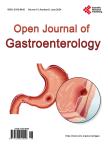Efficacy of Itopride in the Prevention of Lubiprostone-Induced Nausea
Efficacy of Itopride in the Prevention of Lubiprostone-Induced Nausea作者机构:Department of Gastroenterology Kunimoto Hospital Asahikawa Japan Department of Proctology Kunimoto Hospital Asahikawa Japan
出 版 物:《Open Journal of Gastroenterology》 (肠胃病学期刊(英文))
年 卷 期:2014年第4卷第9期
页 面:305-309页
学科分类:1002[医学-临床医学] 100201[医学-内科学(含:心血管病、血液病、呼吸系病、消化系病、内分泌与代谢病、肾病、风湿病、传染病)] 10[医学]
主 题:Chronic Constipation Itopride Lubiprostone Nausea
摘 要:Background: The efficacy of lubiprostone for chronic constipation has been established through phase III clinical trials. Nevertheless, the continuation of lubiprostone therapy is reportedly difficult due to the development of nausea. The objective of this study is to determine whether the administration of itopride hydrochloride can reduce lubiprostone-related nausea. Methods: Two hundred and thirty-five patients who were receiving lubiprostone (24 μg capsule twice daily) were enrolled. Seventy-one patients took a prophylactic dose of itopride (50 mg tablet twice daily) together with lubiprostone to prevent nausea. Thus, the patients were divided into 2 groups: lubiprostone alone (164;control group) and combination therapy with lubiprostone and itopride (71;itopride group). Efficacy measures included changes in constipation scoring system scores, the incidence of treatment-related adverse events including nausea, and the percentage of patients who discontinued treatment within two weeks after administration. Results: Of the 235 patients who were enrolled, 196 were available for analysis. Both treatment groups experienced statistically significant improvements in constipation scoring system scores. The percentage of patients who reported ≥1 adverse event was significantly higher in the control group (40.9%) than in the itopride group (21.9%). The percentage of patients experiencing nausea was statistically and significantly lower in the itopride group than in the control group (9.4% versus 22.7%). The itopride regimen was also statistically superior compared to the control regimen in terms of treatment discontinuation. Conclusion: The prophylactic administration of itopride can decrease the risk of nausea in patients receiving lubiprostone and consequently reduce the risk of treatment discontinuation.



